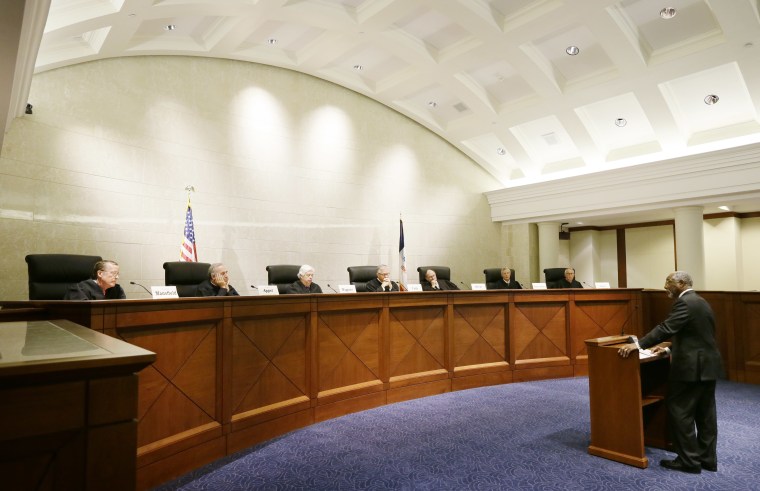The Iowa Supreme Court ruled Thursday to uphold the state’s ban on voting by ex-felons unless their rights are restored by the governor, disappointing voting rights advocates who were aiming to weaken the ban.
The 4-3 decision means Iowa remains one of just three states — Florida and Kentucky are the others — with lifetime voting bans for former felons, barring intervention from the governor.
Related: Virginia Governor Enables 200,000 Felons to Vote in November
The case had been brought by the ACLU, part of a nationwide effort to challenge bans on voting by ex-felons, which disenfranchise nearly six million Americans. A ruling for the plaintiff Thursday could have restored the right to vote to several tens of thousands of Iowans.
"This ruling means that Iowa will continue to serve as a notorious outlier when it comes to restricting people’s right to vote,” said Julie Ebenstein, an attorney with the ACLU’s Voting Rights Project.
At issue in the case was the Iowa Constitution’s ban on voting by those convicted of “infamous crimes.” Until recently, that’s been interpreted to mean any felony, and some misdemeanors. But in a 2014 case challenging the eligibility for office of a state senate candidate who had been convicted of a drunk driving offense, the court suggested that to qualify as “infamous,” the crime must undermine the democratic process. That prompted the ACLU to bring Thursday’s case.
Related: Maryland Restores Voting Rights for Over 40,000 Felons
But the Supreme Court ruled that any felony does still qualify as an infamous crime, though it left the door open for that to be reconsidered in the future.
"The term ‘infamous crime’ was generally recognized to include felony crimes at the time our constitution was adopted. This meaning has not sufficiently changed or evolved to give rise to a different meaning today. In addition, unlike some past cases when we have interpreted provisions of our constitution, the facts and evidence of this case are insufficient to justify judicial recognition of a different meaning,” wrote Chief Justice Martin Cady. “This conclusion is not to say the infamous-crime provision of our constitution would not accommodate a different meaning in the future. A different meaning, however, is not for us to determine in this case. A new definition will be up to the future evolution of our understanding of voter disqualification as a society, revealed through the voices of our democracy.”
Related: Baltimore Ex-Felons Cherish Newfound Right to Vote
The plaintiff, Kelli Griffin, was convicted of a drug-related offense in 2008. A mother of four, Griffin was told that when she completed her probation she’d be eligible to vote. That was true at the time, thanks to a 2005 executive order by then-governor Tom Vilsack, a Democrat, that restored voting rights to any Iowan who had completed his or her sentence. But in 2011, Gov. Terry Branstad, a Republican, took office and, in one of his first official acts, repealed that order, meaning former felons would have to complete a lengthy application process, with the decision up to the governor.
Branstad’s office said in January that it had restored voting rights to 82 people in the five years since he took office.
Unaware of the rule change, Griffin went to vote in a local election in 2013, even bringing her kids with them to teach them about the democratic process. Shortly afterwards, she was charged with perjury in connection to illegal voting—part of an aggressive effort by Matt Schultz, then Iowa’s secretary of state, to find cases of illegal voting and build support for a voter ID. Griffin was quickly acquitted at trial in 2014, though she paid about $10,000 in legal costs.
Related: Federal Court Strikes Down Voter ID Law
“Why shouldn’t we be able to vote for who is on our school board, for who is the president of the United States, or who is our governor?” Griffin asked in an interview with MSNBC last year. “I believe we have as much right as anybody else.”
The Iowa ruling runs somewhat against the recent tide, with several states moving to limit or scrap bans on felon voting. Earlier this year, Maryland lawmakers overrode a veto by the governor to approve a bill that restores voting rights for those who have served their sentences. Virginia governor Terry McAuliffe issued an order re-enfranchising people who have completed their sentence and parole, affecting over 200,000 Virginians — though state GOP leaders are suing to block it. Kentucky has begun a process that will likely lead to a relaxing of its law. And there are even grassroots efforts underway in Florida, whose lifetime ban on felon voting, reinstated under Gov. Rick Scott, keeps nearly one in four black men from the polls.
